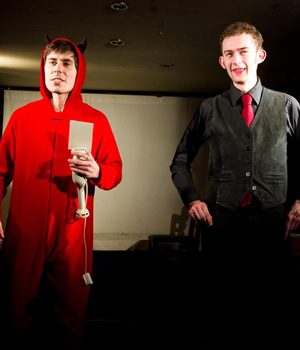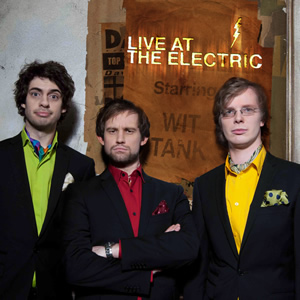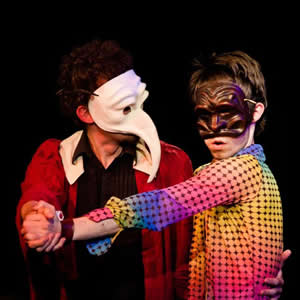Sketch Comedy Versus Stand-Up

Ralph Jones, 50% of sketch group The Awkward Silence, explains why live sketch performing is great, despite it supposedly being the 'least attractive, most socially challenged sibling of the comedy family'...
'Why bother doing sketch comedy?'. I believe this to be a question on the minds of plenty of those in the world of comedy - indeed it was one explicitly asked of me in a recent interview - and, in light of the considerable stand-up boom on television and in vast theatres across the country, it is worth tackling why one would choose what might appear to be the least attractive, most socially challenged sibling of the comedy family.
Sketch comedy, after all, rarely aspires to such mainstream status. With the exception of a few examples (The Mighty Boosh; Little Britain), the notion that there is anything larger than a devoted but modest following for sketch performers is one of wishful thinking. Sketch doesn't bind people in the same way because it doesn't speak to people directly; it is generally more esoteric, stranger and perhaps even colder than stand-up. Never has this difference been more apparent for us than at the very worst gig we have ever done, at Oxford's Glee club last year. In the face of a Saturday night crowd consisting to no small extent of stag and hen night parties, you had better not decide that it would be advisable to do sketches in which, in the guise of Mole and Badger, you discuss the anthropomorphism in The Wind In The Willows. Why the suicidal nature of this plan didn't dawn on me sooner I do not know, but what I do know is that we would have given anything on that evening to a) have the ground engulf both of us, or b) morph into one person and become a stand-up.
So, in the midst of what is generally held to be an incredibly healthy time for stand-up, has sketch comedy simply gone out of fashion? I believe that there are legs to this argument, especially when one considers that there has not been a hugely successful television sketch vehicle - to rival the likes of Little Britain or The League Of Gentlemen - for a number of years. Leaving stand-up aside for a second, the 21st century could so far be argued to have been the age of the awkward, realist sitcom (Peep Show, The Office, The Thick Of It) and one might make the case that sketch, with its larger-than-life weirdos and stupid hats, has lagged rather behind.

But is this because, of late, we just haven't been seeing enough high-quality sketch comedy and thus we are forgetting just how good it can be? Recently BBC Three aired Live At The Electric, a commendable and (to my mind) successful attempt to showcase some of the circuit's best stand-up, character and sketch acts. One of the reasons the programme worked was that it demonstrated that sketch groups - of whom I thought WitTank (pictured) were by some way the best example - are more than capable of providing the solid belly-laughs generated by stand-up. I thought, in fact, that it was the show's sketch groups came out of things looking freshest and most watertight. This demonstrated something regular watchers and performers of live sketch comedy already know: that there are plenty of brilliant sketch acts on the circuit, all capable of making large numbers of people laugh like gibbons. The continued development of programmes like Live At The Electric (two more series on the way) in place of panel shows like Comedy World Cup is essential if the circuit's best acts are to be given any valuable exposure whatsoever.
It is worth noting here what appears to be the jealous nature of each of the forms. Stand-up and sketch appropriate features of the other in an attempt to have their cake and eat it. Stand-ups will, for example, and it goes without saying, not just tell but re-enact stories in which multiple characters are involved, because of the recognition that audiences like not just straightforward jokemanship but also more developed scenarios. In a similar sense, sketch recognises its major flaw - namely its distancing audiences through the assumption of a 'fourth wall' - and often actively seeks either to address the audience directly, in the manner of a stand-up, or be all too keen to engage in fake corpsing in order to provide a glimpse of the faces behind the masks. It is extremely rare - all the more so if the performers are already famous in their own right - to see a live sketch show in which the façade does not slip and the real personalities are not revealed. Despite sketch's strengths it is assumed (where it is not so in theatre or musicals, for example) that there is only a certain amount of detachment an audience can take. In sketch, audiences love to see the slight tears in the stitching.

Stand-up can seem at first glance to be considerably more free than sketch but it is also bound by rules that sketch is more at liberty to ignore. A sketch group can, for example, with neither apology nor explanation, set a sketch in a monastery and populate it with a team of Mormon grizzly bears. A stand-up has to go to considerable lengths to justify and to explain this kind of tangent and may be at greater risk of confusing his audience unless they're Mormons or bears.
However, where a stand-up is comparatively free is in his ability to abandon or elaborate upon a scenario according to the response of his audience. Here improvisation plays a crucial role, being as it is significantly more difficult to practise in sketch than in stand-up. A stand-up can draw attention to the ways in which a particular premise may not have 'worked', or may be dividing an audience, but a sketch act must dive in head-first and hope for the best. Here the directive voice of the stand-up is most important; the audience are being led around by the perception of events, but in sketch are only being provided glimpses into fictional worlds.
There is a very clear and discernible platform for stand-up but the same can't currently be said to true of sketch. The two forms aren't in any way mutually exclusive of course but I feel that sketch comedy ought to fight its way back onto both radio and television because of its incredibly healthy status on the live circuit. This viewpoint is based in absolutely no way on the desire to promote the sketch nights we regularly run on the live circuit.
To find out more about The Awkward Silence visit www.theawkwardsilence.co.uk
Help us publish more great content by becoming a BCG Supporter. You'll be backing our mission to champion, celebrate and promote British comedy in all its forms: past, present and future.
We understand times are tough, but if you believe in the power of laughter we'd be honoured to have you join us. Advertising doesn't cover our costs, so every single donation matters and is put to good use. Thank you.
Love comedy? Find out more
